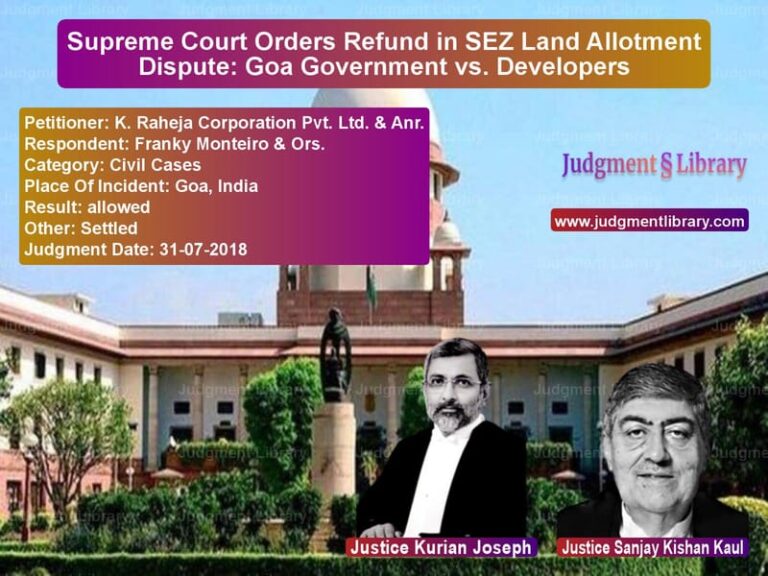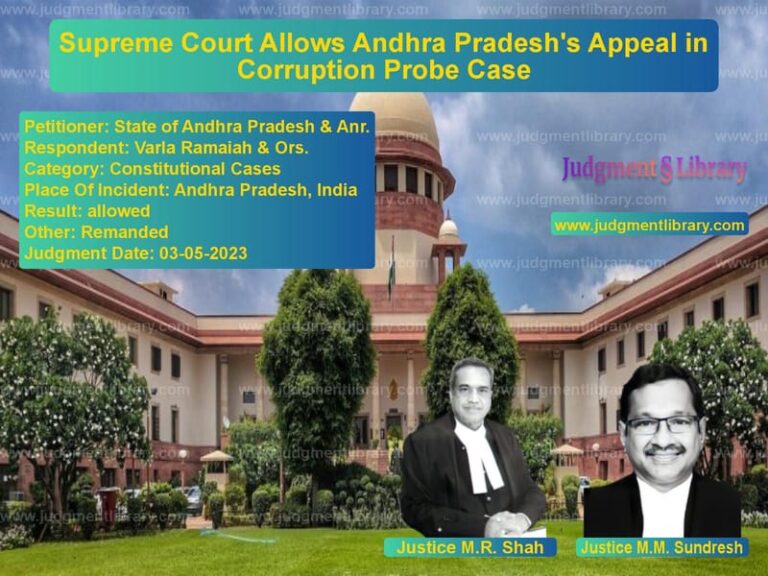Legal Battle Over HPV Vaccine: Supreme Court Examines Parliamentary Report and Government Actions
The case of Kalpana Mehta & Others vs. Union of India & Others is a landmark case concerning the approval and administration of the Human Papilloma Virus (HPV) vaccine in India. The litigation, initiated in 2012 and 2013, challenged the actions of the Drugs Controller General of India and the Indian Council of Medical Research (ICMR) regarding the vaccine’s introduction and trials conducted in Gujarat and Andhra Pradesh. The Supreme Court was tasked with addressing concerns over procedural lapses, informed consent, adverse health effects, and the legal validity of relying on Parliamentary Standing Committee reports in judicial proceedings.
The petitioners alleged that the vaccine trials, sponsored by international pharmaceutical companies and conducted with the support of the non-profit organization PATH International, had resulted in the deaths of several young girls and serious health complications among others. The key legal questions before the Court included the legality of the vaccine’s approval process, the adequacy of consent protocols, and whether the Court could consider a Parliamentary Standing Committee report as evidence.
Background of the Case
The HPV vaccine, developed to prevent cervical cancer, was introduced in India under the auspices of the Government of Gujarat and the Government of Andhra Pradesh. The petitioners argued that the regulatory agencies failed to ensure due diligence in approving the vaccine and neglected to obtain proper consent from participants in the trial. Additionally, they pointed to the 72nd and 81st Reports of the Parliamentary Standing Committee, which highlighted several irregularities in the approval and administration of the vaccine.
Key concerns raised in the litigation included:
- Whether the Drugs Controller General of India and ICMR followed due process in approving the vaccine.
- Whether the selection of trial locations in Gujarat and Andhra Pradesh was arbitrary.
- The cause of deaths and other health complications among vaccine recipients.
- Whether parental consent was obtained for administering the vaccine to minors.
- The role of international pharmaceutical companies and NGOs in conducting the trials.
Arguments by the Petitioners
The petitioners, represented by senior advocates Colin Gonsalves and Anand Grover, contended that:
- The vaccine was introduced without adequate scientific scrutiny, compromising the health of trial participants.
- The government had failed to monitor the adverse effects of the vaccine, leading to preventable deaths.
- The Parliamentary Standing Committee’s findings provided substantial evidence of regulatory lapses and unethical practices.
- The absence of informed consent from minors’ parents violated fundamental rights.
- The trials were financially supported by foreign entities, raising questions about corporate influence on public health policies.
Arguments by the Respondents
The Union of India, represented by then-Attorney General Mukul Rohatgi and Solicitor General Ranjit Kumar, defended the vaccine trials, arguing that:
- The vaccine had undergone rigorous testing before its introduction in India.
- Adverse reactions were within acceptable medical limits and did not establish causation between the vaccine and reported deaths.
- The Parliamentary Standing Committee’s report could not be relied upon as evidence in a court of law.
- The trials were conducted in accordance with international standards, and concerns about consent were exaggerated.
Supreme Court’s Key Observations
The bench, comprising Justices Dipak Misra and Rohinton Fali Nariman, examined whether a report of a Parliamentary Standing Committee could be treated as evidence in judicial proceedings. The Court posed two critical questions for consideration:
- Can the Supreme Court rely on a Parliamentary Standing Committee report in a writ petition under Article 32 or Article 136 of the Constitution?
- Does such reliance violate the principles of parliamentary privilege and the constitutional separation of powers?
In its judgment, the Court held that:
- Parliamentary Standing Committee reports, while valuable for policy deliberations, cannot be treated as binding evidence in judicial proceedings.
- Using such reports as primary evidence would invite judicial scrutiny of legislative processes, potentially violating Article 105 and Article 122 of the Constitution.
- The Court could take cognizance of the broader issues raised in the petitions but would require independent evidence to substantiate claims of regulatory failure.
- The consent process in clinical trials needed further scrutiny, and the government was directed to improve oversight mechanisms.
Implications of the Judgment
- The ruling clarified the constitutional limitations of judicial reliance on parliamentary materials, reinforcing the principle of separation of powers.
- The judgment prompted the government to reassess regulatory safeguards for vaccine trials and strengthen informed consent protocols.
- It reaffirmed the importance of independent judicial review in cases of alleged regulatory failure, separate from parliamentary oversight.
Conclusion
The Supreme Court’s decision in Kalpana Mehta & Others vs. Union of India marked a significant precedent in constitutional and public health law. By striking a balance between judicial intervention and parliamentary privilege, the Court reinforced the need for transparent regulatory oversight in medical trials while upholding the constitutional doctrine of separation of powers. The case underscored the critical role of informed consent in medical research and set the stage for further legal scrutiny of public health policies in India.
Don’t miss out on the full details! Download the complete judgment in PDF format below and gain valuable insights instantly!
Download Judgment: Kalpana Mehta & Othe vs Union of India & Oth Supreme Court of India Judgment Dated 05-04-2017.pdf
Direct Downlaod Judgment: Direct downlaod this Judgment
See all petitions in Fundamental Rights
See all petitions in Public Interest Litigation
See all petitions in Constitution Interpretation
See all petitions in Judgment by Dipak Misra
See all petitions in Judgment by Rohinton Fali Nariman
See all petitions in partially allowed
See all petitions in supreme court of India judgments April 2017
See all petitions in 2017 judgments
See all posts in Constitutional Cases Category
See all allowed petitions in Constitutional Cases Category
See all Dismissed petitions in Constitutional Cases Category
See all partially allowed petitions in Constitutional Cases Category







